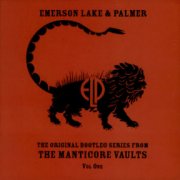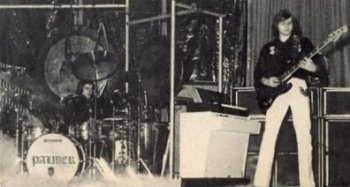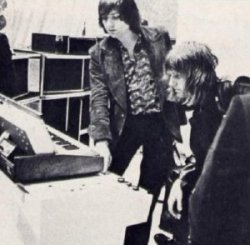



 |
  |
 |
Well, are they or aren't they? There are always going to be at least a few albums whose Mellotron content is uncertain; it may be, but then... Every now and again, these can be verified one way or the other, but there's bound to be a few that always remain a mystery. Many of those below have been removed from the regular reviews pages and will stay here until/if more information is received.
Ratings:
The * rating (½-5) is my personal, entirely subjective and completely partisan rating of the music.
|
East of Eden Emerson, Lake & Palmer |
Grapes of Wrath New Order |
Odissea |
 |
Mercator Projected (1969, 45.11/69.54) **** |
|
| Northern Hemisphere Isadora Waterways Centaur Woman Bathers Communion Moth In the Stable of the Sphinx |
[CD adds: Waterways (demo) In the Stable of the Sphinx (demo) Eight Miles High] |
|
Current availability:
East of Eden (name taken from the Steinbeck book/film, of course) are best-known for their unrepresentative one-off UK hit, Jig-a-Jig, but it seems there was considerably more to the band than that. Formed in 1967, their debut, Mercator Projected, is an excellent electric violin-driven post-psych album with loads of energy and great tunes. They weren't afraid to experiment and stretch out, but there was obviously something about them that didn't really gel with the British scene, as they ended up concentrating on Europe, where they actually had a career.
I'm told there's Mellotron on Mercator Projected (player unknown, as no-one's credited with keys), but even though the monophonic string line on Bathers sounds a lot like an effected MkII, it could just as easily be effected electric violin; the few times two notes are played at once are the giveaway, as it stops sounding like a Mellotron and starts sounding like a solo violin. HOWEVER... without finding out from someone who actually knows, it's almost impossible to say, as it could easily be a Mellotron doubling the violin line; the sound is certainly thick enough, but then it could be the violin double-tracked... As a result, this stays here until/if I find out more. It's a damn' good album either way - worth hearing for fans of the era. Something interesting/amusing I noticed is that the band's drummer at the time, Dave Dufort (or 'Dufont' as it says here) went on to drum with NWOBHM stalwarts Angel Witch a decade later, although he didn't play on their sole major-label release.
 |
The Original Bootleg Series From the Manticore Vaults Vol One, Discs 3 & 4 [a.k.a. The Iridescent Concubine) (2001, recorded 1971-1972, 99.33) ***HoedownTarkus Take a Pebble Lucky Man Piano Improvisation/Take a Pebble (conclusion) Abaddon's Bolero Pictures at an Exhibition Nutrocker Rondo |
Current availability:
Well, they had to get in here eventually, didn't they? Regular readers of this site may possibly have gleaned that I'm not ELP's biggest fan; along with Yes (possibly unfairly in the case of the latter), they're chiefly responsible for the terrible name prog's had ever since punk, er, thirty-five bloody years now... In ELP's case I can actually see their detractors' point; the sainted John Peel, upon seeing their first gig at the 1970 Isle of Wight Festival (start as you mean to go on, eh?), brilliantly described them as, "A tragic waste of talent and electricity", although the band have had the last laugh by outliving him. I've also heard them called 'the nouveaux riche of prog': brash, tasteless show-offs who just have to fling their raw talent around without a thought for where it might land or what harm it might do. Of course, millions of you will strongly disagree with me; you're entitled, just as I'm entitled to my somewhat heretical view, in the eyes of the prog faithful.

Do I actually like anything about them at all? Yes, actually; I love the whole of Pictures at an Exhibition, Fanfare For The Common Man, bits of Karn Evil 9, Knife Edge, a couple of other things. See a pattern emerging? Karn Evil aside, they're all reworkings of classical pieces, which tells you all you need to know about my views on their actual compositional skills, or perceived lack of same. I like Greg Lake's voice on a good day (after all, he's the voice of the first two King Crimson albums), while I have a sneaking admiration for their sheer chutzpah, although said admiration wears appallingly thin when Emerson starts throwing those bloody fourths around, not to mention his Hammond. Speaking of which, I'm not too keen on the tone he gets out of it, but that's my problem, not his.
None of which actually leads us to this review. Emerson famously hated the Mellotron, spouting some guff about how he 'didn't like playing other people's music' (WHAT?), or somesuch bullshit; more to the point, it's difficult to show off on one, as I'm sure I've said elsewhere. Ol' Keith has never been one for playing one note where thirty-seven will do and playing quickly on a Mellotron is nigh-on impossible, although he could've used one very effectively in places. Incidentally, here's an Emo quote on the subject, source unknown:
| "I refuse to play a Mellotron on the grounds that it just doesn't agree with my principles. Because another violinist has had to come in to tape record it and what you're playing is a tape recording - I refuse to play a Mellotron under those situations. Greg has a Mellotron--I don't mind him playing it." |
The stench of bullshit hangs heavy in the air... Anyway, as you can see from the rare-as-rocking-horse-shit pic to the right, ELP did use an M400 very, very briefly. From a mid-'90s interview for Sound on Sound mag:
| Contrary to common belief, Keith once owned a Mellotron. But it was never used conventionally. Keith picks up the story... "After we recorded Trilogy (1972), we wanted to perform the album on stage, but Abaddon's Bolero was a hugely complex track with loads of Moog synthesizer overdubs and it was quite impossible to play it live. So we sampled complete phrases off the 16-track onto a Mellotron, which Greg could play using bass pedals. This still wasn't enough, so we also hooked up a Revox tape recorder and arranged the track around that. Unfortunately, the second time we tried it in front of an audience, the Revox ground to a halt and so did Carl, Greg and myself. We ended up having a huge argument backstage, the result of which was that we never attempted the Bolero again. I would have trashed the Mellotron, but I gave it to Greg instead. I've no idea where it is now." |

Now, parts of that tale don't hang together too well: playing a Mellotron via bass pedals? A Chamberlin remote, maybe, but the pic clearly shows an M400. Anyway, this 'two gigs only' thing makes it most unlikely that any recordings survive. Doesn't it? However, in 2001, the band elected to release a seven-disc set entitled (deep breath) The Original Bootleg Series From the Manticore Vaults Vol One, a severely cheapskate way to make a bit of moolah by selling their fans copies of better-known bootlegs, not even tidied up in the studio. At least Crimson and Zappa did some work on their dodgy recordings... Cheeky or what? Anyway, the first volume (they're up to four so far) contained four different boots, one of which, originally titled The Iridescent Concubine by some drug fiend, is a 1972 recording featuring... Abaddon's Bolero. Now, given its absence from another boot from the set, does that mean that the band accidentally hit the holy grail of ELP Mellotron-spotters? Is this actually one of those two legendary (around here, anyway) gigs, or has Emo lost his marbles and they actually tackled a simplified version on other nights?
Upon listening to the piece in question, the waters only get murkier, which is why this is here and not in the 'regular' reviews. If you know the track, you'll remember that the bass does nothing but pump along on the root note for eight minutes, leaving all the melodic invention to the keyboards, which, for once, actually works quite well. Given the murky audience recording, it's extremely difficult to ascertain whether Mr Lake actually plays said root notes on the bass, on the MiniMoog perched on top of the M400, they're merely implied by the kick drum, or whether, given the custom Mellotron tapes they had made, that note was played from (say) the bottom note on the M400, while the stringy-sounding (but not Mellotron stringy-sounding) part was 'played' further up, in true Patrick Moraz style, by simply pressing keys to trigger whole pre-recorded phrases, as Emo states above. After all, at the end of the day, it's only a glorified tape-player...
D'you know, were it not for that pic (apologies to whoever I ripped it off from, incidentally, whoever you are), I'd seriously doubt the veracity of the whole story, but when you actually see Greg with that set-up behind him, things begin to fall into place. Incidentally, the gig dates from before the album's release (April 21st, at Louisville Town Hall, Kentucky, to be exact, some boots actually titled Abaddon's Bolero), so maybe the whole thing's complete pie in the sky and they just tackled it as best they could, the Mellotron story dating from later that year. A good bootleg listings site tells me that they played the full-length piece (as against a truncated version played the following year) at Brighton that November, so maybe the story originates there? If I get to hear that one, I'll come back and let you know.
Anyway, er, what's the rest of the set like? It's what I take to be a typical ELP set from that year, the band already playing a handful of ludicrously overlong tracks with a few 'shorter' ones in between, disc two (the last four tracks) being rather more interesting to my good self than the first half. Pictures is under half its original length, keeping most of the good bits, although one casualty is Lake's acoustic ballad, The Sage. Stop laughing. Yes, you. Abaddon's Bolero itself is excellent, although Rondo (which they had the cheek to credit to themselves; I don't know if Dave Brubeck's opinion was ever recorded) is over twenty minutes of public masturbation, which is just plain bad manners, basically.
So; there's only one reason to buy this: you're already a huge ELP fan and have to have more. There are no other reasons. These two discs are, at best, average audience recordings, idiotic crowd remarks intact, containing nothing that you can't hear in considerably better quality on the band's regular studio and live releases. Is that missing the point? Probably, especially considering that I own a good few, er, 'unofficial' recordings by artists I actually like, but you'll have to be pretty dedicated to bother trawling through this. Does it contain any Mellotron? Unknown. Perhaps I'll find out for certain one day? Or perhaps I won't.
[A few years later] More news! Here is quite indisputable proof that Greg played Mellotron on stage, at least briefly. Someone's synched up a bootleg recording of Abaddon's Bolero from, I believe, Zürich's Hallenstadion on April 15th 1973 with some single-camera colour footage, possibly shot by a local TV station. He appears to be playing single notes on the familiar strings (so much for the 'pre-recorded phrases'), with bass notes on the MiniMoog sitting on top. And given their usual excessive expenditure, was it really asking too much to put the whole lot on a low riser, so Greg didn't have to risk backache while playing? Anyway, this gig doesn't appear to've been made officially available, so until/unless it is, this lengthy screed will have to stay here.
See: The Nice | King Crimson | Asia | Fanfare for the Pirates
 |
These Days (1991, 54.07) *** |
|
| Away You May Be Right Consequences I Can't Find My Home Days I am Here No Reason Travelin' |
A Fishing Tale Thru to You Now Miracle |
|
Current availability:
The Grapes of Wrath were a Canadian powerpop band, operating at the folky end of the spectrum; 1991's These Days was their fourth album and last before their split (they reformed in 2000 and recorded a sixth record). Apparently, it didn't go down that well with their fanbase, although it sounds like a perfectly good folky pop/rock release to me, the gorgeous electric 12-string on Days bringing The Byrds to mind, although they shamelessly rip Zep's Rain Song on I Can't Find My Home. Naughty.
Now, I've had this on the site as an 'unconfirmed' just about forever and now I hear it, I'm no better off. Unlike many similar, I can't find any references to Mellotron use (although something must have made me put it on here in the first place) and the strings on You May Be Right and flutes on the lengthy Miracle are somewhat inconclusive. The only people involved with the recording who have anything to do with Mellotrons are members of XTC, credited as The Dukes of Stratosphear, who play, er, something on A Fishing Tale, but certainly not Mellotron. As a result, this stays here until/if I should find out anything more useful.
So; a reasonably good album with some very good moments, but the jury's out on its Mellotron content.
See: Samples
 |
Technique (1989, 38.14) ***Fine TimeLove Less Run Round and Round Guilty Partner Vanishing Point All the Way Mr. Disco Dream Attack |
Current availability:
The New Order story is far too familiar to bear any serious repetition; suffice to say, they are essentially the regrouped Joy Division after that band's dissolution following the suicide of vocalist Ian Curtis. New Order have kept a foot in both the indie and dance camps, frequently mixing the two, or producing innovative dance-based material such as 1983's excellent Blue Monday (and no, the choirs on that track are absolutely not Mellotron).
It all seems rather unlikely that they'd use a Mellotron on the acid house-influenced Technique, but halfway through track 3, Run, a familiar-sounding string sound appears, although the more you hear of it, the less Mellotronlike it sounds. 1989 is extremely early in the day for anyone to use Mellotron samples, so the likely scenarios are:
1) It's a generic late-'80s grungy string sample that sounds slightly like Mellotron strings 'cos they're, duh, grungy string samples.
2) It's an early Mellotron sample.
3) It's a Mellotron.
Option 1) would get it disqualified from this site, or at the very best, exiled to Mistaken ID, option 2) gets it stuck in Samples and option 3) doesn't actually seem that likely, so this is going to live here until I can prove which option it falls under.
Anyway, is it a good album? Actually, yes; although I'm not exactly a fan of their thang, this is a pleasant listen with some reasonably groundbreaking material. And a remake of Blue Monday.
See: Joy Division
 |
Odissea (1973, 37.04) ***½UnioneGiochi Nuovi - Carte Nuove Crisalide Cuor di Rubino Domanda Il Risveglio di un Mattino Voci Conti e Numeri |
Current availability:
Odissea's sole release is an above-average slice of typical Italian prog, although at times it sounds just that little bit to close to Genesis for comfort. Strangely, I've seen Odissea described as 'average', but I've heard an awful lot more ordinary albums within the genre, although it has to be borne in mind that the quality of early-'70s Italian progressive was way above that of most countries.
You may have noted that although this album is in 'possibles' rather than 'mistaken identity', none of the tracks above have been highlighted; I was working from an inaccurate tracklisting and since none of the tracks definitely contain Mellotron, time constraints stop me going back to check, at least this week. Most of the strings are, in fact, clearly uncredited string synth, but every now and again, there's the odd note or background chord sequence that just might actually be Ennio Cinguino's credited Mellotron, though I have no idea how I'd find out for sure over 30 years down the line.
Anyway, a good album, though not one of the greats, but some deeply suspect 'Mellotron'. Your choice.